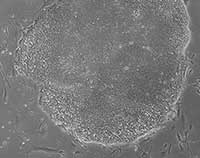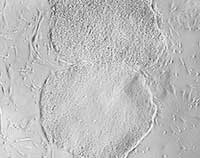The journey: before and after
The following comments trace the journeys made by the writer participants in their understanding of the science and ethics of stem cell research during their time in the group. 'Before' is a reflection of their understanding of the issues at the point of coming to the group. 'After' reflects the experience, knowledge and thinking gained during the project.
BEFORE
What do I know? Make that 'What do I think I know?'
Using cells, whether animal or human to find cures for diseases and disabilities?
Using embryos in medical reasearch. I know that I know, there is a huge debate, for and against.
How do I feel about it? If there is a cure out there for serious illness, let someone find it please. I am afraid of the whole thing, to tell you the truth. To tell you the truth, I don't know what it is. Is something taken from an embryo? Does the embryo survive? I don't even know what to write now.
AFTER
I have learned the scientific definitions of lots of stem cell vocabulary. I have gained an insight into the subject and have been amazed and startled by it all. I want to learn more, but it still scares me.

My concerns about the ethics of it all remain with me and yet, I want them, the scientists, to find cures. I've never been a science sort of person, but I did always suspect that the embryo dies.
Image: stem cell under the microscope, at the University of Newcastle
BEFORE
I see it everywhere but I’m not sure about it. I think its about harvesting the cells from 4-5 day old foetuses – the cells are not yet fixed in function (unlike in adults eg a liver cell can only be a liver cell) so can adapt, be adaptable to a range of functions.
I think my cousin has said she has had 3 stem cell transplants but I’m not sure about that I think it raises issues about the purpose of life and when life begins; is it acceptable to produce tiny ‘humans’ for the sake of others? What about people going through IVF — the emotional investment in the potential of a child when the sperm fertilizes the egg?
What is the responsibility of scientists in pursuit of scientific research? What about technologists who apply the research? What about those whose lives can be saved through this research? Where does ‘LIFE’ stand on this? What about other religions’ perspectives? Who gives permission for the cells to be used?
Can stem cells be taken from anywhere else?
Does Frankenstein come to mind?
Who monitors/regulates the scientists?
Who are the charlatans?
AFTER
I have reflected more on the emotional and moral issues, the differing opinions of those with vested interests. I am clearer about some of the technical vocabulary (I’d never heard of a blastocyst of multi-potent cells). I’m still very hazy about what actually goes on and the scale (microscopic) of the actual experiments. I am still very interested in the charlatans in relation to the other-worldliness of some of the research scientists — do they know what they are unlocking in their pursuit of pure knowledge?
However, I’m no more worried than I was about the ‘human-ness’ of stem cells, in relation to ‘spare cells’ from IVF. They have potential but so do many millions of miscarried fertilized eggs and terminated foetuses. I am worried about the overwhelming emphasis on family life and babies (watch the telly) and the huge pressure this puts on couples, women in particular, I think, to feel that whatever they achieve and whatever they do in their lives, there is some sense of failure if they have been unable to become pregnant.
BEFORE
Ethical dilemmas
Using embryo's as medicine
Somehow related to IVF
Messing with nature
Entangled with religion
Confusing
Stoppable
AFTER
A moral soup
A language unto itself
Somehow related to capitalism
The gift of life
Complicated by religion
Even more confusing
Unstoppable
BEFORE
Stem cells are primary cells that can become any tissue in the body. They are found in embryos and recently have been extracted from amniotic fluid — I believe.
Ethical debate surrounds their use. Exploration in science as to how to use these cells to help medicine. Stem cells are the background material for cloning. Could stem cells be the medium for engineering genetic changes in adults. It is exciting and challenging.
I am unsure how I feel about the embryo situation, Did humans once regenerate with their own continuing source of stem cells? What about bone marrow, this contains stem cells doesn’t it? What about endometriosis — I’ve heard it said that they think the body’s cells may be changing to become endometrium in this disease? I really want to know more.
What are the current proposals, thoughts, theories? Where does research appear to be going right now? What about changes in direction from the past? What can REALLY be done, what is just theory? What would one change if one could just inject a solution of stem cells and wham? Where will it all end up? Evolution by design? Longevity by medical intervention? What does that make us thing about accidents, murder, child birth, overpopulation, starvation, war?
If we can control cells what about the natural time clock — stages of life? What will nature’s backlash be? Will we start engineering the animals and environment around us? Where can I find concrete information, trusted information, how do I know what angle/view point the information is coming from?
AFTER
I have thought more about potential and possible barriers, ethical and physical, and scientific/knowledge wise. More and more I’m thinking nature will deal itself a new hand and shift the goal posts as we start to ‘amend’ things. There will be no finite solutions to the answers like other medicines, like antibiotics, it will be a never ending battle.
I’ve also thought much more about the way it wil affect areas beyond those it is meant to with knock-on effects, into general life — like genetically modified seeds escaping — the same for human life. And I have become aware of much more discussion about the subject — just like when you get a new car and you see the same type everywhere, even though you barely noticed it before, or ironically like being pregnant and seeing other pregnant women everywhere – with their genetically selected babies, cloned children, embryos with all that stem cell potential…

Image right: stem cell under the microscope, at the University of Newcastle
BEFORE
Umbilical cord
Mitochondria
Nucleus
Cells
Embryo — spares from IVF
Diabetes/Parkinsons
Can be grown into anything, therefore non-specific
Helps people with chronic/genetic disease
Clones
Good and Bad — Don’t know much
Controversial
Licensed Research — UK
Frankenstein
Pushing at the boundaries of scientific knowledge
Is it ethical — don’t know
Ambivalent
Media manipulation
Adult cells = consent
Embryonic cells = no consent
Moral dilemma
Designer Babies — cost, who can afford this?
Not seen the same in all parts of the world ie China
Spiritual complications
Where/when does human life begin?
Science can explain the biological process
AFTER
Stem Cell research is a huge subject with good and bad implications. It depends from which view-point you are coming from. It still feels like something from science fiction, but things seem to have progressed so rapidly and so much knowledge has been obtained, that it must now be regarded as science fact.
Lots of moral dilemmas still, again depending on view-point. Some of these dilemmas will probably never be resolved.
Does a clone have the personality of the person it is cloned from? If so, will only those with docile, amenable personalities be seen as suitable for cloning purposes?
Will clones be allowed to live as a sub-species – bred in fact as a type of slave to a super-species or will they only be for spare parts?
So many questions — so many answers.
BEFORE
Stem cell research concerns cells taken via a pipette planted into another organism or an egg, which react in the growth process. The cells are older than the ‘new’ organism, which is why Dolly, the sheep aged so quickly. Organisms can be grown in a Petri dish or in a body. The cells then sometimes mutate which is not what we expect of cloning.
Inherent within the research is ‘species fascism’, all animals as ‘lesser forms’ of life are expendable to the human good. Many of the consequences of doing these implants are unknown and may have positive or detrimental implications to the world.
Stem cell research is owned by and for the profit of big business the spin that the motivation is curing diseases and not making profit and furthering funding and careers of science organisations does not bear scrutiny. The data the scientists gather is not shared amongst other scientists because of business competition within science, hampering progress. Some of it is bad science, not well thought through before the experiments take place and has results that were not even considered by the scientists at the time of their intervention.
AFTER
I am aghast at the way scientists communicate these new methods, blithely uninterested in any consequences or ethics that do not fit their pattern. There is never any allowance that making a chimera out of two separate animal types or beings is beyond the pale. Science as pure thought is good in itself but science as practice is wilfully perverse, you only need to look at the side effects on any medication you might be given by your doctor to see this. Despite the regulations in place, largely on the side of experimentation for its own sake these engineers of bodies are not controlled. The making of chimeras is bound to mutate viruses or other illness-inducing processes, soon viruses that are species limited will be the new ailments of us all some of which will be incurable. For all the positive health benefits of stem cell practice the negatives could be catastrophic.